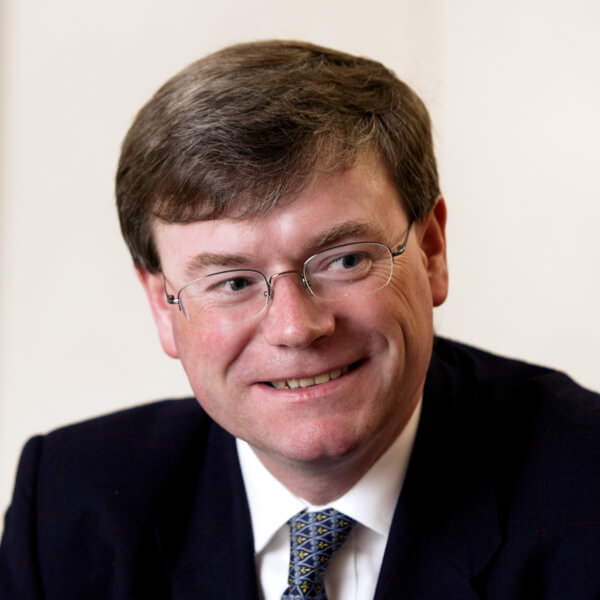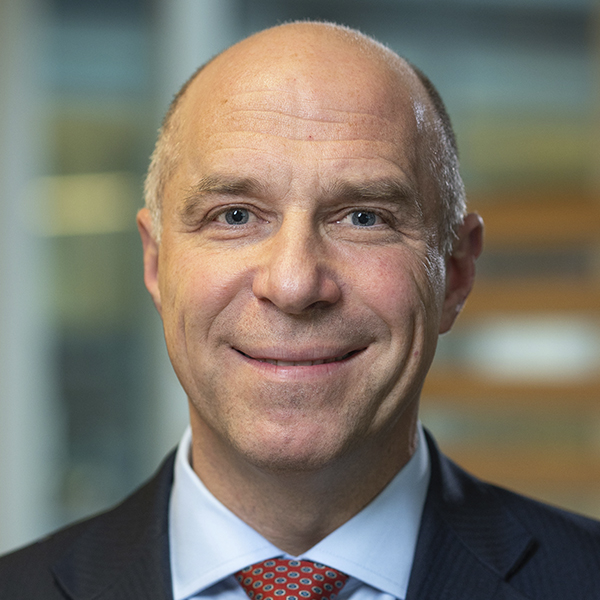Market Volatility
With the world’s economy and markets recovering from the coronavirus-induced shutdown, there is much uncertainty in the outlook for economies and stock markets. Martyn Hole and Peter Becker share their perspectives on the prospects for economies, markets and companies.
What kind of economic recovery do you expect?
Martyn: At Capital Group, since the beginning of the crisis in January we have focused on three factors that we believe will impact the shape of the recovery: the monetary response, the fiscal response and what we expect to happen with the coronavirus.
The below chart shares three potential hypotheses of a shape of recovery and the probabilities that we give them. The best case would be a V-shaped recovery, which would happen because of a strong policy response and a positive medical outcome. The worst case is a W-shape recovery, which would be a poor viral scenario and a bad policy response.
Though the shape and pace remain uncertain, a solid recovery is possible1
.png)
For illustrative purposes only.
We are currently in the U-shape scenario. To reiterate a comment made by Rob Lovelace, vice chairman of Capital Group and an equity portfolio manager: “This is different than the 2008 financial crisis — we can see the other side of the valley, what recovery can look like when policies are relaxed, and that to me is reassuring.”
I would emphasise that the current crisis is very different from the situation we had in the global financial crisis where people had serious existential fears about the stability of the global financial system. This is not something we are facing in the current crisis. So far, the fiscal and monetary response has been very powerful across both the US and Europe and it has happened at a much faster and stronger rate compared to during the global financial crisis.
So far, the viral outcome has perhaps been better than the pessimists have been arguing, but we still don’t have a vaccine or any treatments that are particularly effective.
What are the key implications for the US Federal Reserve (Fed) and the European Central Bank (ECB)?
Peter: Over the past few weeks we entered the ‘reality’ phase where market participants realised the macro environment will be challenged for a long time to come. It could take years to return to the 2019 GDP levels. The Fed and ECB, in particular, have acknowledged this in recent meetings and the market has not priced in a rate hike until at least the end of 2023.
In terms of market implications, in the US it looks likely that we will get stronger forward guidance from September and some sort of yield curve control. That means that the front end of the US Treasury curve is getting anchored at this low level and the yield curve has the potential to flatten in a risk-off scenario. Risk assets should be well-supported by the monetary stimulus but could be vulnerable if we get a second wave of the coronavirus with new shutdowns.
During the last ECB monetary policy meeting, it was announced that the pandemic emergency purchase programme will be increased in size and extended to at least June 2021. The ECB acknowledged the scale of the coronavirus shock to the economy and that inflation remains low for much longer. It’s clear the central banks will be providing policy accommodation for a long time and the period of low yields will remain for the foreseeable future.
Has the crisis brought about opportunities for equity investors?
Martyn: Many of the powerful secular trends that were in place within equities preCOVID 19 have been accelerated by this crisis.
1. As at 31 May 2020. Data for the three recovery scenarios are based on estimates from Capital Group economist Jared Franz. GDP: gross domestic product. Sources: Capital Group, Bureau of Economic Analysis, Refinitiv Datastream
Risk factors you should consider before investing:
- This material is not intended to provide investment advice or be considered a personal recommendation.
- The value of investments and income from them can go down as well as up and you may lose some or all of your initial investment.
- Past results are not a guide to future results.
- If the currency in which you invest strengthens against the currency in which the underlying investments of the fund are made, the value of your investment will decrease.
- Depending on the strategy, risks may be associated with investing in fixed income, emerging markets and/or high-yield securities; emerging markets are volatile and may suffer from liquidity problems.
Our latest insights
-
-
European Equity
-
Economic Indicators
-
-
RELATED INSIGHTS
-
Portfolio Construction
-
-
Fixed Income
Past results are not a guarantee of future results. The value of investments and income from them can go down as well as up and you may lose some or all of your initial investment. This information is not intended to provide investment, tax or other advice, or to be a solicitation to buy or sell any securities.
Statements attributed to an individual represent the opinions of that individual as of the date published and do not necessarily reflect the opinions of Capital Group or its affiliates. All information is as at the date indicated unless otherwise stated. Some information may have been obtained from third parties, and as such the reliability of that information is not guaranteed.
 Martyn Hole
Martyn Hole
 Peter Becker
Peter Becker